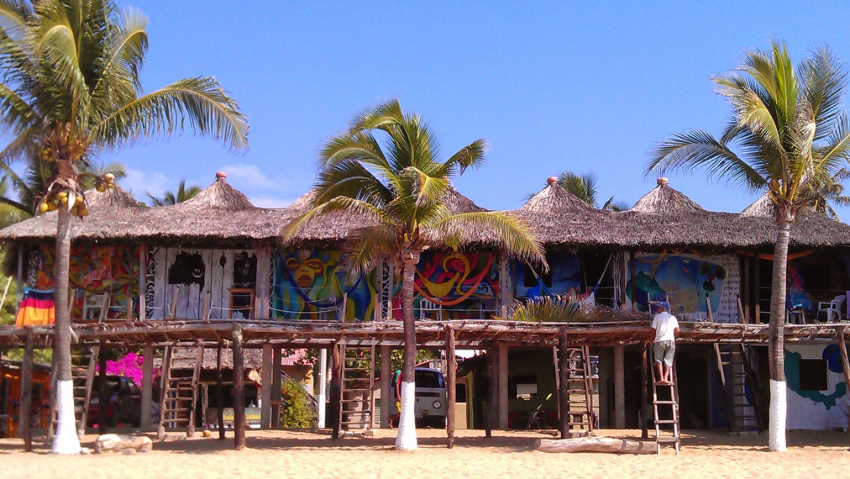As the bus neared my destination, I continued to struggle to decide which town I would choose for my stay in the region. There were five of them along the coast, all within a mile of each other and all very different. According to my guidebook, Zipolite was a small hippie enclave where most of the accommodations listed displayed the price for sleeping in a hammock. While I’d enjoyed plenty of naps in a hammock, the thought of sleeping the entire night in one conjured up images of spending the the next day trying to realign my spine. The book romanticised the rustic accommodations, and while I admit this sounded like an ideal beachside experience, I knew I prefered the conveniences of staying in a reasonably sized town.
The bus dropped me off, and the driver pointed down the road when I asked where I might find a hotel I’d thought sounded the least rustic in my book. It was the only one that advertised having internet access, something I was just not willing to live without, especially with not a whole lot to entertain myself with each day. The woman at the desk quoted me $25 per night for a shared room, which is more than I’d paid in the biggest cities for a room of my own with air conditioning. She thought she’d sell me on the room by taking me up to see it, and I was embarrassed for her when I walked into a dorm room so basic looking that it only served to further dissuade me from staying there.
I decided to head to my second choice, a Yoga retreat at the far end of the beach. It was hard work trudging along with a heavy backpack, made more difficult by the loose sand. About halfway down the beach, I passed by a set of cabañas, which were basically one room cabins on stilts just at the edge of the high tide line. Each was vividly painted with a different theme: one with Where’s Waldo, another with the Cheshire Cat. Just outside the door of each of the cabañas was a hammock, and I was relieved to see that within was a bed. This seemed to me like exactly the rustic experience the book described and one I thought I couldn’t pass up.
I thought the rate of $12 per night seemed reasonable, but I would later learn just what I had sacrificed in that $13 savings. The Cabaña reminded me of cabin you would have camped in while visiting a national park in the 1940s only on stilts. A very basic 10 foot by 10 foot square with pine paneled walls and a pyramid shaped thatch roof. Hanging from the apex of the roof was a mosquito net draped over the sleeping pallet below. Still, it beat sleeping in a hammock. There were in fact, people who appeared to be camping there, some with campers parked beneath the stilted cabins; others with tents pitched in the shade of the them.
The cabañas had the feel of a lifeguard tower: A high perch overlooking the beach where the pastime seemed to include sitting in a chair in front of your cabaña watching the nudists stroll down the beach or taking a nap in your hammock. These places were truly designed for doing nothing. In fact, in the whole two days I was there, I noticed there was one guy who never left his perch. The steps to the cabaña went almost straight up from the sand below, and I made a note to be sure to dehydrate myself several hours before bedtime, lest I have to maneuver down them in the middle of the night. Alternatively, I realized, I could probably just pee from my perch if I had to.
I was told that they didn’t have internet, but as I walked towards town to grab lunch, I realized I hadn’t noticed whether there was electricity or lighting in the cabañas. Would I need to be home before dark? And what was I going to do without my daily dose of Dexter? I wasn’t even sure if I was going to be able to read since I hadn’t thought to check for a light. I really didn’t want to go to bed at 8PM. This was starting to feel more and more like camping, but with the help of an internet cafe and a flashlight, I did managed to stay up until 10 o’clock before deciding to retire.
For the first time in my life, I attempted to arrange mosquito netting over my bed and wondered why the top was designed in the shape of a circle when the bed to be covered had four corners. The end result was that the netting touched my body in several places, and I figured it wouldn’t be a great effort for a mosquito to get at my blood at one of the touch points.
I awoke the next morning and carefully navigated down the stairs for my morning constitutional. I’d been pretty regular and solid which was impressive given the number of times I’d eaten street food in the past month, but this morning broke that trend, and it wasn’t until then that I noticed there was no toilet paper in the bathroom. Feeling somewhat panicked, I gingerly made my way to the other stalls, which also proved to be devoid of the necessary clean-up material. This was definitely too much like camping.
I managed to make it back to my room and found a map of Acapulco that I wouldn’t need anymore. It seemed entirely fitting that a place I’d described as smelling of human waste was now being used to remove it from my body.
My experience in Zipolite taught me that I can trust my instincts, and that rustic isn’t exactly the experience for me, at least when I am unprepared for it.

